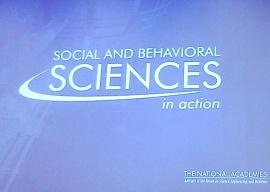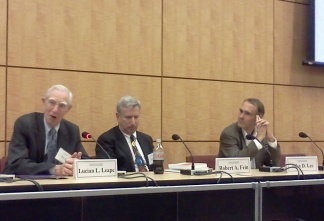Health, Engineering, and National Security Experts laud Life-Saving Impact of Social Sciences
“I am extremely impressed by what the social and behavioral sciences are doing and  what their prospects are… What a wonderful way to try to achieve a more rational civilization, to not back away from the complexity, but to be ambitious about it and to design inquiries in ways that would be meaningful…to take on the ambition in the first place, that the scientific method is valuable, even if you’re studying things that aren’t dead.” – Ralph J Cicerone, President of the National Academy of Sciences
what their prospects are… What a wonderful way to try to achieve a more rational civilization, to not back away from the complexity, but to be ambitious about it and to design inquiries in ways that would be meaningful…to take on the ambition in the first place, that the scientific method is valuable, even if you’re studying things that aren’t dead.” – Ralph J Cicerone, President of the National Academy of Sciences
On September 24, 2012, a group of scholars and experts who are not traditionally associated with the social sciences were found in one location discussing the important accomplishments of social and behavioral scientists. This symposium, titled “Social and Behavioral Sciences in Action,” is available free to the public via webcast by clicking here.
SAGE and CQ Press were honored to sponsor the event, which was organized by the Division of Behavioral and Social Sciences and Education (DBASSE) of the National Research Council for of the National Academy of Sciences. It began with an introduction by Kenneth Prewitt from the School of International and Public Affairs at Columbia University and chair of the DBASSE advisory committee.
“How do we make sure that the resources of scientific intelligence, whatever the disciplinary base is, actually get into the settings that they want to be used?” asked Prewitt. “Use is itself a social phenomenon. It is not a biological phenomenon, it is not a natural history phenomenon, it is not an engineering phenomena, it is something that people do. So the second major challenge for the social sciences is not only to help a society think about responses to social conditions that need attention, but also to think about how much of our knowledge is used and how will it be used. That is a social science problem.”
Rita R. Colwell, a natural scientist and president and chairman of COSMOSID, delivered a compelling keynote address as she discussed how the social sciences enabled the implementation of a water filtration system in Bangladesh villages. She stated that the work of the social sciences functioned to understand the cultural practices of the Bangladesh people and then to put into practice a filtering system that prevents cholera and saves lives.
 In a panel presentation and discussion on the importance of the social and behavioral sciences for Medicine, National Security, and Engineering, three additional researchers and experts made a compelling argument for the role of social sciences in their life-saving work.
In a panel presentation and discussion on the importance of the social and behavioral sciences for Medicine, National Security, and Engineering, three additional researchers and experts made a compelling argument for the role of social sciences in their life-saving work.
Lucian L. Leape, from the Department of Health Policy and Management in the Harvard School of Public Health, lauded the social sciences for their role in implementing better health care systems. He stated that issues of hospital culture including improving teamwork, promoting disclosure, and stifling disrespectful behavior, are studied and implemented only through the social sciences and can have crucial impacts on hospitals.
Robert A. Fein, from The Metis Group and Department of Psychiatry at Harvard Medical School, discussed the important role of the social sciences in making important discoveries about national security including assassination, school shootings, and interrogation. His own social science research has led to real changes in the secret service and to discoveries about patterns common to many school shooters.
The last speaker of this panel was John D. Lee from the Department of Industrial and Systems Engineering at the University of Wisconsin-Madison. He discussed the technology and human cognition balance in research about problems surrounding distracted driving. Lee stated that research that focuses exclusively on technology fails as it can have little effect on actual behavior and can’t capture the dynamic relationships that people create with new technology.
The meeting was concluded with remarks by the presidents of the three organizations represented within the National Academy of Sciences – Ralph J. Cicerone, President of the National Academy of Sciences, Harvey V. Fineburg, President of the Institute of Medicine, and Charles M. Vest, President of the National Academy of Engineering.
Ralph’s remarks summarized the mission of the event succinctly as he commented on the precision that is involved in social science research, “I see tremendous rigor in the way that most of you are taking on really complicated issues…In experimental design for example, in certain fields of social and behavioral sciences, there was more rigor, more pre-thought going into how to design an experiment to be able to get to the heart of the matter, than I was seeing in all of the fields I was familiar with … There was tremendous commitment to rationality, to take on really complicated issues.”
For more information about the Social and Behavioral Sciences in Action initiative, click here.
Read Related Articles
A Sociology of Financialisation?
The Importance of Studying the Obvious
Rejoinder to Gary Guttings Doubts about the Behavioral Sciences



























































































